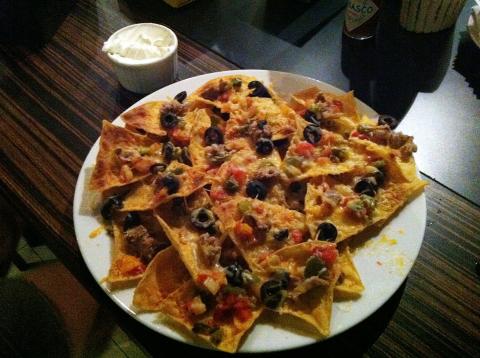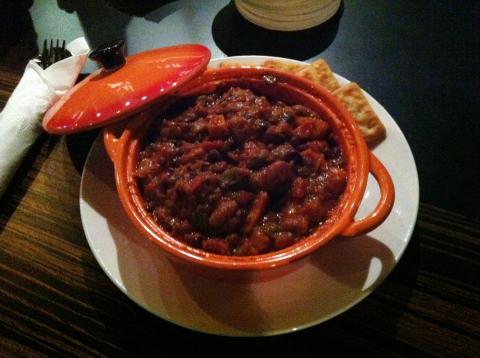The expat community in the Sindian (新店) area has a new spot for reasonably priced, home-cooked meals. The Green Hornet Cafe serves simple Tex-Mex and Western fare, and makes for a nice alternative to the night market food stalls and overpriced restaurants in the Bitan (碧潭) riverside park area.
Named and decorated in honor of the 1960s television show and movie, the Green Hornet Cafe feels more like a neighborhood pub than a cafe, but that’s the way owner Peter Dearman intended it to be.
Dearman, a 41-year-old Canadian expat who came to Taiwan in 1998 and now calls Taipei home, had been yearning for a welcoming place near where he lives at which customers could dine and stay for a beer or two afterward. He opened shop in May.

Photo: David Chen, Taipei Times
The burritos are a favorite among Green Hornet habitues. The regular option (NT$120, comes in a set of two) is filled with refried beans made from scratch, salsa, jalapenos, cheese and sour cream. Have them with beef or chicken for NT$140, or replace the refried beans with chili for NT$130.
Another popular item is the nachos, which Dearman says are a house specialty. The regular version (NT$120) comes with salsa, Monterey Jack and Cheddar cheese, refried beans, jalepenos and black olives, all mixed together nicely in several layers of tortilla chips. The nachos nearly ruin your appetite for dinner — they were so tasty that my friend and I gobbled them up quickly.
You won’t find burgers and fries at the Green Hornet, a conscious decision on the part of Dearman, who says his motto for the restaurant is “No grease, no BS.” By the latter, Dearman means no fancy names and not too many obscure ingredients, just plain meals that are nourishing, relatively healthy and easy to prepare.

Photo: David Chen, Taipei Times
I liked the vegan chili (NT$140), which is probably one of the menu’s more exotic items. It won’t take top prize in any chili cook-offs, but it still offers plenty of homemade goodness. Ingredients include fresh kidney, pinto and black beans (the Asian soybean variety), lentils and quinoa, all stewed in a garlic and onion tomato base. Chili is also available with beef for NT$160, and expect both types to be spicy unless you request otherwise. Rice can be ordered for an additional NT$20.
Carnivores will likely enjoy the 10oz-cut of New York steak for NT$400 or the 12oz rib eye sirloin for NT$380, which both come with a side of vegetables and mashed potato. Dearman recommends the steamed mussel soup (NT$150), one of his favorite comfort foods from his childhood in Nova Scotia.
With all of the framed photos of Bruce Lee (李小龍) as Kato hanging on the walls (hunt around for the one Jay Chou (周杰倫) poster), customers could guess that Dearman is an obsessive fan of the Green Hornet.
He isn’t. He chose the name because it was “easy to remember,” and he felt that Lee was a “fitting” cross-cultural symbol for a restaurant serving Western food in Asia.
The Green Hornet is still a work in progress. Dearman plans to expand the menu, and eventually extend his business hours beyond dinner, with an eye on serving a Sunday brunch.
There is no waitstaff at the moment and Dearman does all the cooking, so patience might be in order if the place is full. That’s all the more reason to take advantage of the free WiFi and have a cold beer. A pint of Guinness is NT$180 and San Miguel is NT$130, or try to beat the heat with a bottle of Hunter’s Cider (NT$150) or Savanna (NT$170), both South African brews.

Oct. 27 to Nov. 2 Over a breakfast of soymilk and fried dough costing less than NT$400, seven officials and engineers agreed on a NT$400 million plan — unaware that it would mark the beginning of Taiwan’s semiconductor empire. It was a cold February morning in 1974. Gathered at the unassuming shop were Economics minister Sun Yun-hsuan (孫運璿), director-general of Transportation and Communications Kao Yu-shu (高玉樹), Industrial Technology Research Institute (ITRI) president Wang Chao-chen (王兆振), Telecommunications Laboratories director Kang Pao-huang (康寶煌), Executive Yuan secretary-general Fei Hua (費驊), director-general of Telecommunications Fang Hsien-chi (方賢齊) and Radio Corporation of America (RCA) Laboratories director Pan

President William Lai (賴清德) has championed Taiwan as an “AI Island” — an artificial intelligence (AI) hub powering the global tech economy. But without major shifts in talent, funding and strategic direction, this vision risks becoming a static fortress: indispensable, yet immobile and vulnerable. It’s time to reframe Taiwan’s ambition. Time to move from a resource-rich AI island to an AI Armada. Why change metaphors? Because choosing the right metaphor shapes both understanding and strategy. The “AI Island” frames our national ambition as a static fortress that, while valuable, is still vulnerable and reactive. Shifting our metaphor to an “AI Armada”

When Taiwan was battered by storms this summer, the only crumb of comfort I could take was knowing that some advice I’d drafted several weeks earlier had been correct. Regarding the Southern Cross-Island Highway (南橫公路), a spectacular high-elevation route connecting Taiwan’s southwest with the country’s southeast, I’d written: “The precarious existence of this road cannot be overstated; those hoping to drive or ride all the way across should have a backup plan.” As this article was going to press, the middle section of the highway, between Meishankou (梅山口) in Kaohsiung and Siangyang (向陽) in Taitung County, was still closed to outsiders

The older you get, and the more obsessed with your health, the more it feels as if life comes down to numbers: how many more years you can expect; your lean body mass; your percentage of visceral fat; how dense your bones are; how many kilos you can squat; how long you can deadhang; how often you still do it; your levels of LDL and HDL cholesterol; your resting heart rate; your overnight blood oxygen level; how quickly you can run; how many steps you do in a day; how many hours you sleep; how fast you are shrinking; how